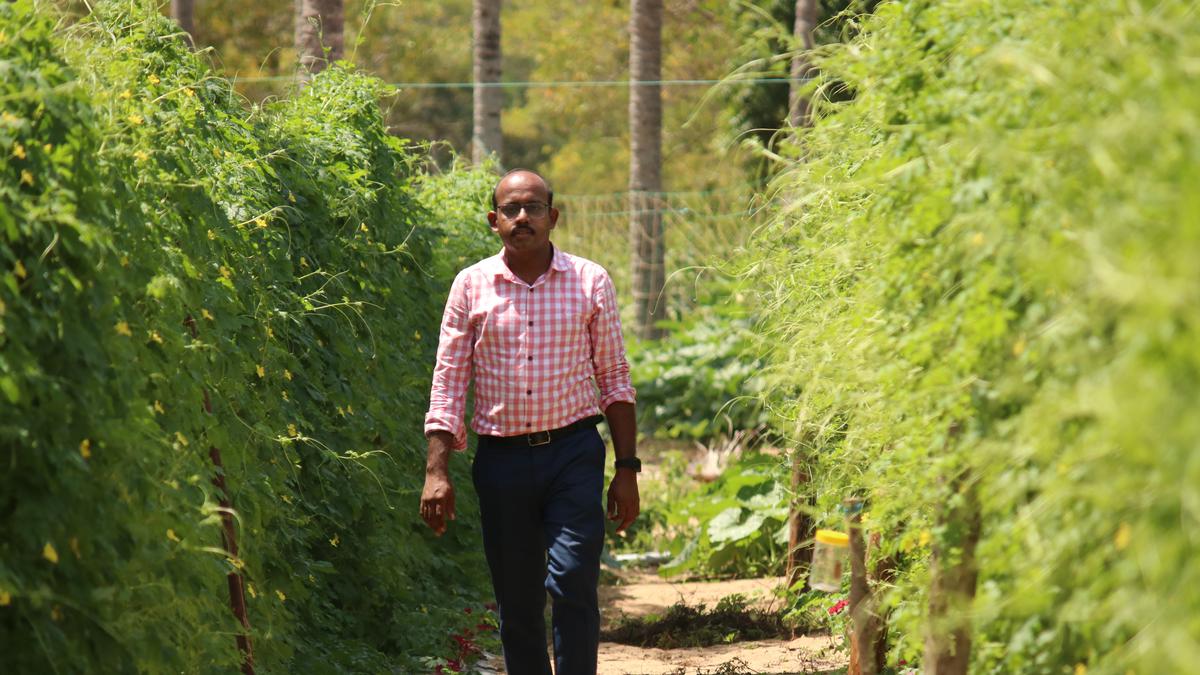
Rendezvous with three Kerala State Farm Award winners from Thiruvananthapuram Premium
The Hindu
meet the farmers from thiruvananthapuram who won kerala state farm awards 2022
SV Sujith, Shraddha Sharad Patil and Vijaya Bhaskar are three farmers from Thiruvananthapuram who have won Kerala State Farm awards 2022 for their green fingers. If Sujith won Haritha Mithra award for the best vegetable farm, Shraddha bagged the award for adopting hi-tech farming techniques and Vijaya for her terrace garden. MetroPlus caught up with them to find out how they sowed the seeds of success.
“Failures have made me what I am today,” says SV Sujith. His farm, Naaden Agro, is on a 22-acre leased plot inside St Xavier’s College, Thumba, 13 kilometres from Thiruvananthapuram.
Sujith has cultivated on sandy soil by adopting open-precision farming, a method that uses technology and data-oriented tools to improve crop production. Over 40 crops such as amaranthus, brinjal, bitter gourd, snake gourd and long beans are grown here. Yellow and orange marigolds and maize are grown as barrier crops to reduce pest attack.
A post-graduate in management, Sujith, 39, left his well-paying job in Bengaluru to take up farming eight years ago. “A health scare and some other experiences taught me that health is important and that safe food is a must. I had an interest in farming from my childhood. While in Bengaluru, I connected with several farmers. I began farming on a small scale at my home in Karakulam in 2012-13. Instead of becoming a full-fledged famer, I started by procuring vegetables from farmers and selling the produce. Then I tried contract farming and when problems cropped up, I leased land in Parassala block and later in Kollam district,” he says.
The produce, branded Naaden, was sold through outlets in the city and in Kollam. But, there was a slump in business after a while and he faced severe financial crisis. Refusing to quit, Sujith started again by first cultivating on a 15-acre leased plot at Channankara, near Thumba, and then at St Xavier’s. “By then I knew what I should not do. We focus on need-based production so that produce doesn’t go to waste,” he adds.
Cocopeat, cow dung and poultry manure that are needed for manure are locally procured. Vermicompost is made at the inhouse unit or collected from the zoo. A 70,000-litre water tank is also set up at the farm.
Currently he employs 12 labourers. He has signed an MoU with St Xavier’s College under which a paid internship is given to students of the college. “They stay back after college hours to work on the farm and I give them a monthly stipend. Fourteen of them have already finished their internship, I plan to employ some of them in the farm.” He has also entered into an MoU with Mar Baselious College for further development of the farm, especially with regard to technology, fertigation (supplying dissolved fertiliser through irrigation system) and creating a database. He has been getting help from College of Agriculture, Vellayani, and Kadinamkulam Krishi Bhavan.













